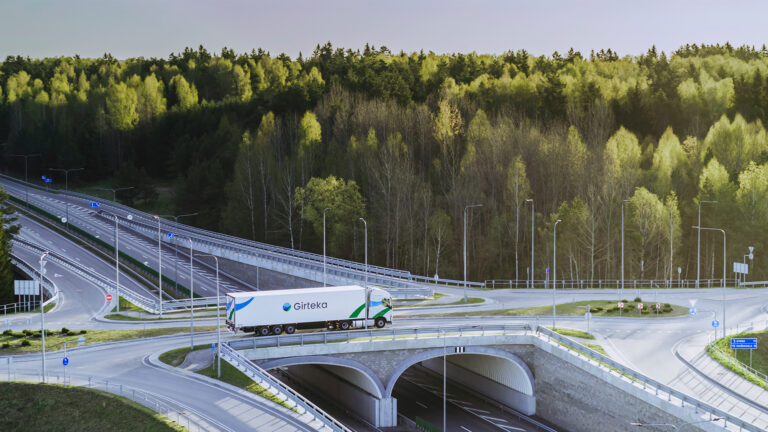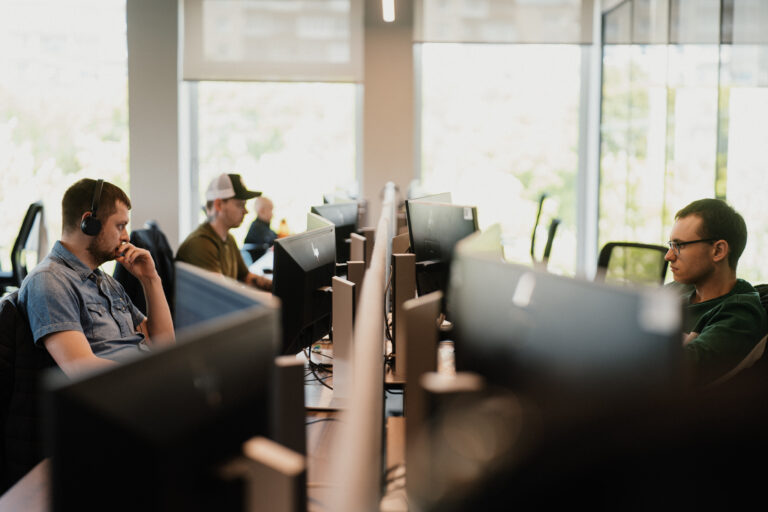Share it:
Girteka has established new multimodal transportation services from Finland to Germany. The company can now offer more sustainable solutions utilizing its fleet capacity and connecting road transportation with ferry services. Integrating multimodal solutions is one of the ways to effectively tackle the issues of driver shortage and decarbonization. Such an approach allows to develop logistics services that contribute to improved drivers’ working conditions, while helping reduce emissions from road freight transport.
Scope of new multimodal services
In a strategic collaboration with Finnlines and Transfennica, Girteka is providing services from Hanko in Finland to Rostock and Lubeck in Germany, crossing almost 1,000 km over the Baltic Sea.
Thanks to an expansive fleet of more than 7,000 trailers, the company offers customers an unparalleled level of flexibility and efficiency. The unique model allows for trailers to be left at one port and a new one to be collected at the destination, optimizing cargo turnover, and reducing idle times.
This robust service is available seven days a week, ensuring consistent delivery times that match their road-only options, yet with notably fewer CO2 emissions.
“By strategically transferring a portion of road freight in the direction from Finland to Germany through sea routes, we not only alleviate the pressure on heavily congested highways but also contribute significantly to lowering CO2 emissions. So far with this new service, we managed to save more than 330 thousand kg of CO2 emissions, covering 350 thousand of kilometers” – explains Adele Lasionytė, Head of the Business Unit at Girteka.
Additionally, the service aims to elevate Girteka’s drivers’ comfort and job satisfaction. By facilitating shorter, more localized routes, Girteka is not only reducing its environmental impact but also enhancing the working conditions for their valued drivers.
By traveling shorter distances drivers can have more flexibility and opportunities to achieve a good work-life balance, which the company is focused on.
Potential for future services’ expansion
As the logistics industry faces the dual challenges of decarbonization and maintaining a competitive edge, multimodal and intermodal transportation options are emerging as increasingly viable alternatives to traditional road freight.
“Looking into the future, we see considerable potential in expanding our multimodal and intermodal services. As the interconnectedness of global supply chains increases, we are actively investigating additional routes to connect Northern Europe with other continental regions. This strategy aligns with our customers’ objectives, which extend beyond decarbonization to encompass overall efficiency and stakeholder benefits, – whether it is clients, partners, or our team, particularly, our drivers. This multi-faceted approach to logistics exemplifies our commitment to responsible business practices,” – summarizes A. Lasionytė.
Sustainable transport: a win-win situation for all
The sustainability of multimodal transportation, particularly when integrating road and ferry services, represents a transformative approach to reducing the logistics industry’s environmental impact.
Due to their scale, ferries offer more energy-efficient means of transporting goods over long distances. This is pivotal in the ongoing effort to decarbonize transport.
Moreover, the ability for drivers to leave their trailers at the port for pick-up by another driver minimizes idle times and engine runtimes, further reducing the carbon footprint.
By optimizing this blend of road and ferry transportation, Girteka will enhance its operational efficiency, creating a win-win scenario for the environment, our customers, and the broader logistics ecosystem.



